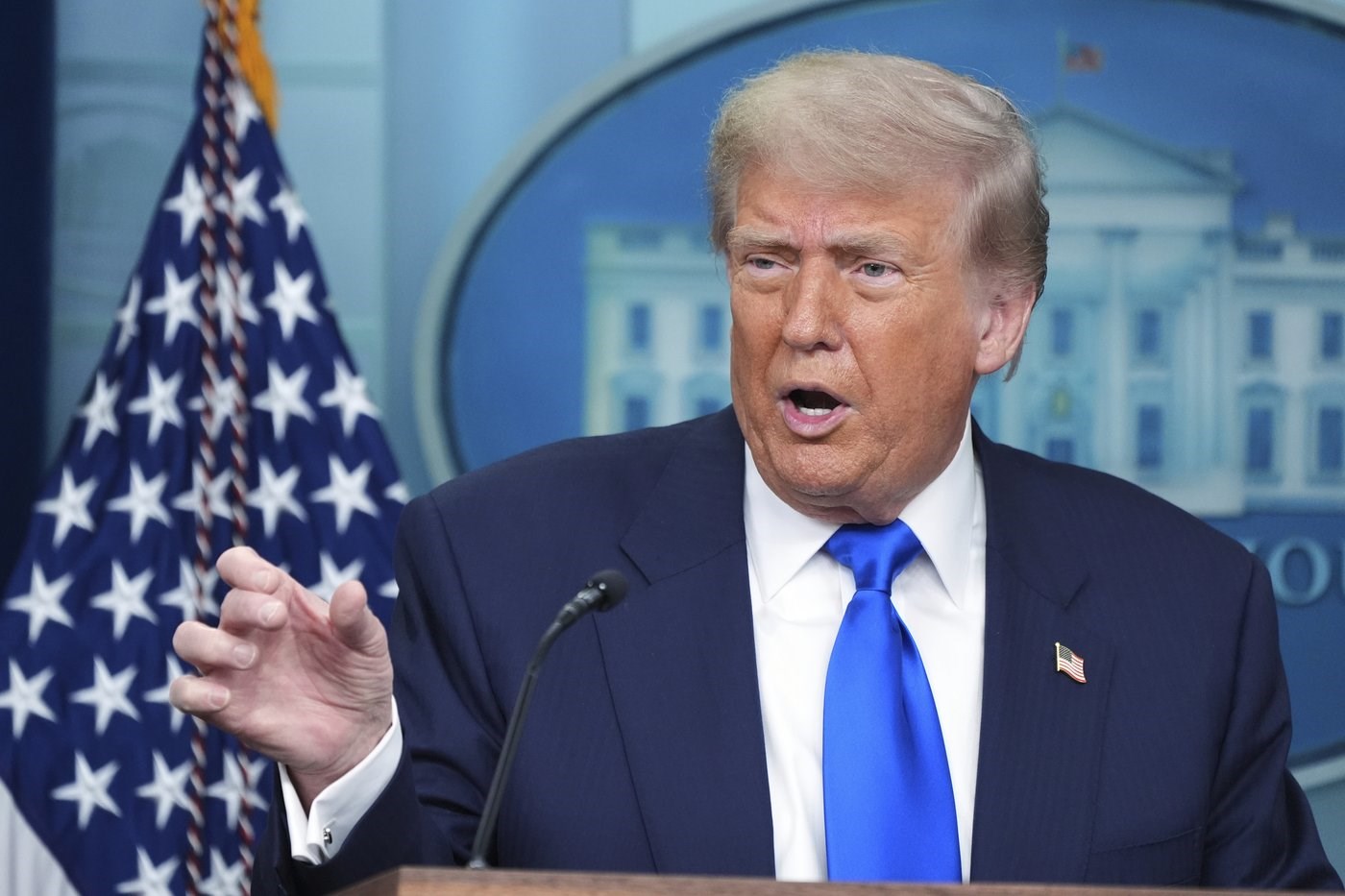
President Donald Trump speaks to the media on Friday, June 27, 2025, in the briefing room of the White House in Washington. (AP Photo/Jacquelyn Martin)
Republished June 27, 2025 - 3:11 PM
Original Publication Date June 27, 2025 - 10:56 AM
OTTAWA — Prime Minister Mark Carney says he did not speak Friday with Donald Trump before the U.S. president announced a sudden end to trade negotiations in response to Ottawa's plans to push ahead with a digital services tax at the end of the month.
On his platform Truth Social, Trump wrote that he was "terminating all discussions on trade with Canada" because of the tax, set to apply this Monday to major American online companies such as Amazon, Google and Airbnb.
Trump wrote Friday afternoon that Washington will notify Canada of new tariff rates required "to do business with the United States" within the next seven days, which would mean the July 4 national holiday.
An hour later, Carney told reporters he had not spoken with Trump that day.
"We'll continue to conduct these complex negotiations in the best interests of Canadians," the prime minister said.
Carney was chairing a meeting of his council on Canada-U.S. relations just moments before Trump lashed out, according to the prime minister's official itinerary.
Trump called the proposed tax a "direct and blatant attack on our country" and complained about Canada's dairy-sector protections that include high tariffs on imports of American milk and cheese.
Carney has been negotiating in private with Trump and said earlier this month the two governments are pursuing a deal to end the president's stop-and-go tariff war. At the G7 summit in Alberta, Carney and Trump agreed to work on reaching a deal by mid-July.
The digital services tax is a three per cent levy on revenue from Canadian users of digital services such as Amazon, Google, Meta, Uber and Airbnb. It takes effect on June 30 but is retroactive for three years. The initial bill facing American companies is expected to be close to $2 billion.
The United Kingdom kept a similar tax in a trade deal with the U.S. that was signed last week at the G7 summit in Alberta. Trump said similar measures by the European Union would be part of the broader trade talks the U.S. is having with the bloc.
In the Oval Office, Trump said Canadians are great people but their government has unfair policies. "Canada has been a very difficult country to deal with over the years," he told reporters.
Trump added that Ottawa has less leverage than Washington.
"Economically, we have such power over Canada. I'd rather not use it but they did something with our tech companies," he said.
"It's not going to work out well for Canada. They were foolish to do it. And so I said we're going to stop all negotiations with Canada right now, until they straighten out their act."
Conservative Leader Pierre Poilievre did not weigh in on whether Canada should scrap the digital sales tax. Instead, he suggested Canada should cut its own domestic taxes and levies to unleash more economic growth.
"Disappointed that trade talks have halted. Hopefully they resume quickly. As always, Conservatives are ready to help get a good deal for Canada. We must put Canada First," Poilievre wrote on the platform X.
In a written statement, NDP trade critic Heather McPherson said Canada should invest in employment insurance and sustainable jobs to protect workers from Trump's whims.
"Appeasement doesn’t work. Betting on having a unique relationship with Trump doesn't work. Negotiations in secret doesn't work. Standing up for Canadian jobs and communities does," she wrote.
In a post on the platform X, Bloc Québécois Leader Yves-François Blanchet blamed Carney for Canada's failure to get the tariffs lifted and suggested he has been distracted by legislation to fast-track the approval of major projects like oil pipelines.
The Canadian Chamber of Commerce has urged Ottawa for months to scrap the tax, citing increased costs and the risk of U.S. retaliation.
"Negotiations go through peaks and valleys. With deadlines approaching, some last-minute surprises should be expected," chamber head Candace Laing said in an email.
"The tone and tenor of talks has improved in recent months, and we hope to see progress continue. We respect that Team Canada is conducting these negotiations at the table, and we need to give them the space to navigate."
The American Chamber of Commerce in Canada said Washington had been clear that the tax "would be viewed as a provocation" and urged Ottawa to cancel the tax.
The Canadian Press has asked the office of Finance Minister François-Philippe Champagne for comment but has not yet received a response.
The Business Council of Canada has called on Ottawa to suspend the tax.
“Canada should put forward an immediate proposal to eliminate the DST in exchange for an elimination of tariffs from the United States,” wrote the group’s CEO Goldy Hyder, adding Trump’s decision is the “unfortunate development” the group had warned about.
Earlier this month, 21 members of the U.S. Congress wrote to Trump saying the digital services tax could inspire other "discriminatory cash grabs" that largely target American companies.
But on Thursday, congressional Republicans agreed to remove a so-called "revenge tax" provision from Trump's major tax cut bill, in response to a request from Treasury Secretary Scott Bessent.
That provision would have allowed Washington to impose taxes on companies and investments from countries charging what it called "unfair foreign taxes" on American firms.
— With files from Kyle Duggan, Anja Karadeglija and The Associated Press
This report by The Canadian Press was first published June 27, 2025.
News from © The Canadian Press, 2025